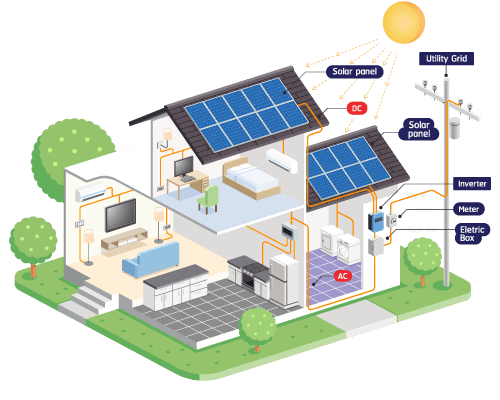A Step toward Solar Electric Systems and Clean Energy
Introduction
In the quest for sustainable and clean energy sources, solar electric system has emerged as a frontrunner. With advancements in technology and a growing awareness of environmental issues, more individuals and businesses are turning to solar power as a reliable and eco-friendly energy solution. This comprehensive guide aims to unravel the complexities of solar electric systems, exploring their functionality, benefits, installation process, and environmental impact.
Understanding Solar Electric Systems
How Do Solar Electric Systems Work?
At the core of solar electric systems are photovoltaic (PV) cells, which convert sunlight into electricity. These cells are made from semiconductor materials, often silicon. When sunlight strikes these cells, electrons are set into motion, creating an electric current. This direct current (DC) is then converted into alternating current (AC) through an inverter, making it compatible with the electrical systems of homes and businesses.
Types of Solar Electric Systems
- Grid-Tied Systems: These systems are connected to the utility grid, allowing excess electricity to be fed back into the grid. This setup enables users to receive credits for the surplus energy produced, potentially leading to reduced electricity bills.
- Off-Grid Systems: Ideal for remote locations without access to the grid, off-grid solar electric systems operate independently. They store excess energy in batteries for use during periods of low sunlight.
- Hybrid Systems: Combining the features of both grid-tied and off-grid systems, hybrid systems offer flexibility and reliability. They are connected to the grid but also incorporate battery storage for backup power during outages.
The Benefits of Solar Electric Systems
1. Renewable and Sustainable
Solar energy is an infinite and sustainable resource. The sun, our primary source of solar power, is expected to radiate energy for billions of years. Harnessing this energy reduces dependence on finite fossil fuels, promoting a cleaner and more sustainable future.
2. Reduced Electricity Bills
By generating your own electricity, you can significantly reduce or even eliminate your reliance on the traditional utility grid. This leads to lower electricity bills and, in some cases, financial incentives such as net metering, where excess energy can be sold back to the grid.
3. Low Maintenance Costs
Solar electric systems have minimal moving parts, translating to lower maintenance costs compared to traditional power systems. Regular cleaning and occasional checks are usually sufficient to keep the system running efficiently.
4. Environmental Impact
Solar power is a clean and green energy source, producing minimal carbon emissions during operation. By choosing solar electric systems, individuals and businesses contribute to the reduction of air pollution and the fight against climate change.
5. Energy Independence
Solar electric systems empower users to generate their own electricity, reducing dependence on external sources. This not only provides energy security but also insulates users from fluctuations in energy prices.
Installing Solar Electric Systems
1. Site Assessment
Before installation, a thorough site assessment is crucial. Factors such as sunlight exposure, shading, roof condition, and available space are considered to optimize the system’s performance.
2. Choosing the Right System Size
The size of a solar electric system is determined by the energy needs of the user. A professional installer can help assess energy consumption patterns and recommend an appropriately sized system.
3. Installation Process
The installation typically involves:
- Mounting solar panels on the roof or on the ground.
- Installing an inverter to convert DC to AC.
- Connecting the system to the electrical panel.
Professional installers ensure compliance with local regulations and safety standards.
4. System Integration
Once installed, the solar electric system seamlessly integrates with existing electrical systems. Users can monitor energy production through online platforms provided by many solar companies.
Environmental Impact of Solar Electric Systems
The environmental benefits of solar electric systems extend beyond reduced carbon emissions. Solar power helps conserve water resources, as it doesn’t require water for cooling, unlike traditional power plants. Additionally, the minimal land footprint of solar installation allows for coexisting land use, such as agriculture or wildlife habitats.
Overcoming Challenges
While solar electric systems offer numerous benefits, certain challenges must be addressed:
1. Initial Costs
The upfront costs of purchasing and installing a solar electric system can be a deterrent for some. However, many governments and financial institutions offer incentives, tax credits, and financing options to make solar power more accessible.
2. Intermittency and Energy Storage
Solar power generation is dependent on sunlight, making it intermittent. To address this, energy storage solutions like batteries are becoming increasingly important, providing a reliable power source during cloudy days or at night.
3. Aesthetics and Space Limitations
Some individuals may find solar panels aesthetically unpleasing, and not all locations have the space required for efficient solar power generation. However, advancements in solar technology are leading to more aesthetically pleasing and space-efficient solutions.
The Future of Solar Electric Systems
As technology continues to advance, the future of solar electric systems looks promising. Innovations in materials, energy storage, and efficiency are driving down costs and improving performance. The integration of smart technologies, such as artificial intelligence and IoT, will enhance the monitoring and control of solar electric systems, making them even more user-friendly and efficient.
Conclusion
Solar electric system represents a transformative force in the energy landscape, offering a sustainable and clean alternative to traditional power sources. The benefits, from reduced electricity bills to environmental conservation, make them an attractive choice for individuals and businesses alike. As technology evolves and adoption increases, solar electric systems will play a crucial role in shaping a greener and more sustainable future for generations to come.

